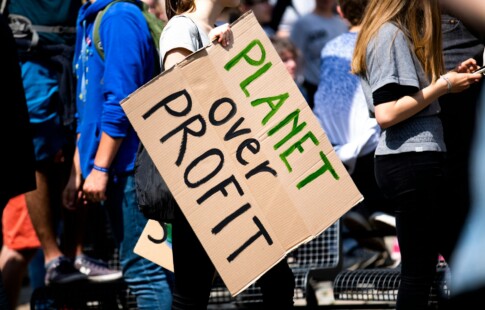
Top Environmental Nonprofits to Watch in 2020
We are reader-supported. When you buy through links on our site, we may earn affiliate commission.
In the face of climate change, environmental nonprofits are committed to making the world a greener, cleaner place. How do you know which ones are really doing the work, though?
Unfortunately, many organizations green-wash their corporate social responsibility, and claim to be making a difference without really doing much. Luckily, there are plenty of environmental nonprofits taking a stand against pollution, environmental degradation and natural resource depletion.
From the food system to renewable energy, here are the top 10 environmental nonprofits to watch in 2020.
1. Environmental Defense Fund
The Environmental Defense Fund was founded in 1967 and has been a key player in many notable efforts. It was integral to the success of banning the chemical DDT in 1972, which enabled the passing of the Safe Drinking Water Act and the Clean Air Act, and helped found the Climate Action Partnership in 2007.
Today, the EDF focuses on curbing carbon emissions, which helps to incentivize sustainable farms and food security, and reforming chemical policy to protect human health. Its mission is to use economic incentives to drive environmental progress. It also partners with small businesses and multinational corporations to affect change.
2. World Resources Institute
The World Resources Institute is a global nonprofit focused on research. It works with government entities, corporations, private companies and other nonprofits to address environmental responsibility and global climate change issues. Its focus on food, forests, water, energy, cities, climate and oceans are commendable.
In 2020, the World Resources Institute addressed disaster preparedness and the link between climate change and the COVID-19 pandemic. Some of its projects include the redirection of agricultural subsidies to regenerative farmers, planning a low-carbon economic recovery after COVID-19 and a new framework for financial institutions that use data tools to set climate targets.
3. Earthjustice
Earthjustice, formerly the Sierra Club Legal Defense Fund, is dedicated to litigating environmental issues and has been involved in legal matters since 1971. It focuses on three key goal areas: the preservation of natural habitats, healthy communities and clean energy.
The team of attorneys at Earthjustice are some of the top environmental lawyers in the world, and additional staff includes research analysts, scientists and policy experts. The Earthjustice team has played a decisive role in some of the most important environmental law cases in recent history.
4. Rocky Mountain Institute
Although the Rocky Mountain Institute has been around since 1982, it has only more recently made headlines. The group focuses on consulting, research and publication in the field of sustainability, but focuses primarily on making clean energy profitable. Its work covers a wide breadth of programs, including energy-efficient buildings, climate finance, clean economies and renewable industry.
Rocky Mountain Institute’s mission is to transform global energy by engaging communities and businesses to “cost-effectively shift from fossil fuels to efficiency and renewables.” It’s committed to creating financial incentives for renewable energy, thus helping cities and regions meet clean energy goals.
5. Fashion Revolution
Fast fashion has a huge carbon footprint. In fact, one of the most popular clothing materials, polyester, is the largest source of microplastic pollution. Fashion Revolution works for reform within the industry. It’s focused on increasing transparency in the fashion supply chain.
One of Fashion Revolution’s most significant contributions is its Fashion Transparency Index. It includes 40 of the largest global fashion brands and bases their ranking on five criteria: governance, traceability, policy and commitment, show and fix, and spotlight issues.
6. Regeneration International
Regenerative agriculture is part of the solution to the industry’s negative impact on the environment. Regeneration International is committed to transforming the global food system. It focuses on three major program areas: education, network-building and policy work.
Reduced greenhouse gas emissions requires a transition away from fossil fuels. It also requires sequestering already released carbon back into the soil. Regenerative land management practices help achieve this. A core belief of Regeneration International is that a transformed agriculture system will revitalize local economies, enhance human health, end corporate control over the food system and promote social justice.
7. Food Recovery Network
The Food Recovery Network is a national nonprofit that works with colleges and universities to recover food waste from campus dining halls. The food is given to those in need, and more than 3.9 million pounds of food have been donated since 2011.
Food waste is a huge problem in the United States, and there are so many networks that work together to fight it and eliminate hunger. For example, Crisp is a demand-forecasting software for food supply chains that helps companies reduce their production to avoid waste. With nonprofits like the Food Recovery Network, people can use education and technology to solve waste in their local communities.
8. Food Tank
Food Tank is a think tank for food. It’s committed to food system change and works toward solutions that alleviate hunger, obesity and poverty. Food Tank features innovative people and organizations worldwide, and highlights those who work toward sustainable change.
Food Tank features news articles on a variety of topics that relate to sustainable agriculture and a more resilient food system. These resources are integral to recognizing organizations who make strides within the food industry and educates consumers about agricultural issues. For example, a current article by Food Tank covers the meatpacking plant closures due to COVID-19 and the economic impact this has for hog farmers.
9. 5 Gyres Institute
The 5 Gyres Institute is devoted to the reduction of plastic pollution. It works with the United Nations Economic and Social Council and is one of only two organizations that have sent expeditions to research the Great Pacific Garbage Patch.
5 Gyres is also a founding member of the Plastic Pollution Coalition, a global alliance of businesses and thought leaders work to reduce plastic pollution and its impact on humans and the environment. One of its most significant research endeavors is the San Francisco Bay Microplastic Project, which provides critical data on solutions to plastic pollution throughout the Bay Area.
10. Fibershed
The fashion industry is a huge contributor to greenhouse gas emissions, and pollution doesn’t just come from manufacturing. How textiles are produced plays a significant role in carbon emission, and Fibershed is looking to change that. It’s committed to developing relationships between independent producers who help to rebuild regional manufacturing and create an international system of producers that engage in climate-friendly methods.
One of Fibershed’s best-known programs is Fiber Systems Research. It focuses on land-based models that measure climate impact and inform new institutional changes within fiber production. The nonprofit also investigates emerging markets, like hemp, and whether alternative materials may be more environmentally friendly options for fiber producers.
Supporting a Greener Earth
Supporting environmental nonprofits is an important step in advocating for sustainable change. It is essential to research organizations before you donate or volunteer to make sure they’re committed to making real change. Whatever cause is closest to your heart, this list of the top 10 environmental nonprofits in 2020 is a great place to start.
Share on
Like what you read? Join other Environment.co readers!
Get the latest updates on our planet by subscribing to the Environment.co newsletter!
About the author

Jane Marsh
Starting from an early age, Jane Marsh loved all animals and became a budding environmentalist. Now, Jane works as the Editor-in-Chief of Environment.co where she covers topics related to climate policy, renewable energy, the food industry, and more.





